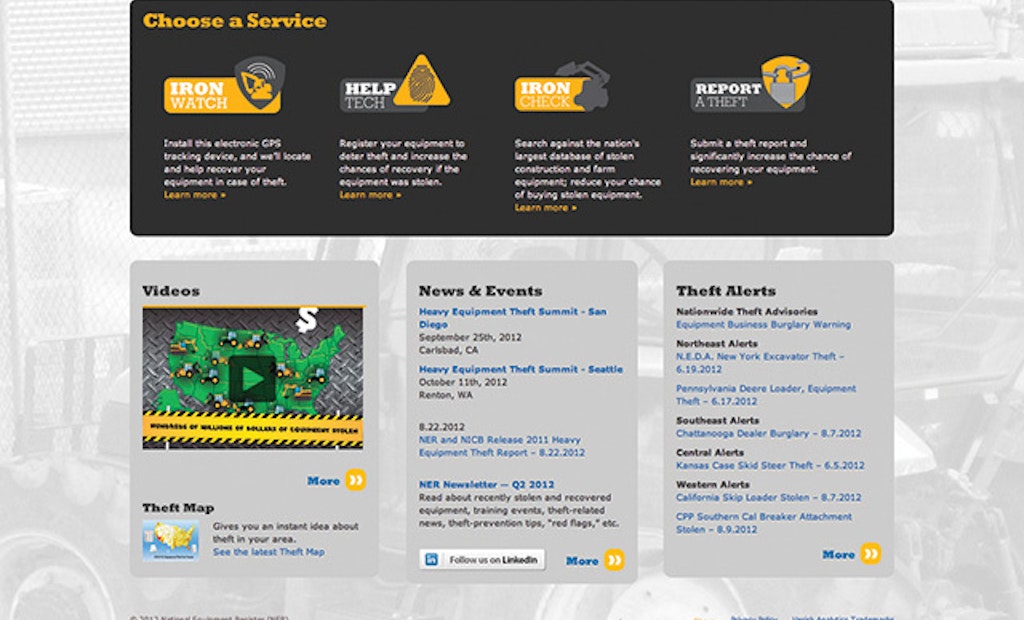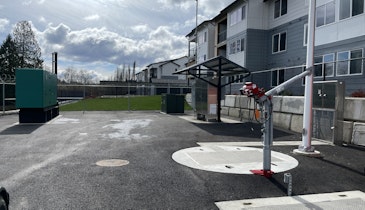Every year heavy equipment worth millions of dollars is stolen from contractors across the nation. In 2010 alone, more than 13,000 machines were reported stolen, says Ryan Shepherd, operations manager for the National Equipment Register (NER). That number is based on police reports, insurance data and reports to the NER, so it might leave out thefts that go unreported.
Nineteen percent of the equipment reported stolen – about one in five pieces – was recovered, according to the NER's 2010 annual report. Where does stolen equipment go if not recovered? Mostly for resale to used-equipment buyers or to scrap metal processors. If you're buying on the used market, a really good deal may be "hot" in more ways than one.
National register
The NER (www.ner.net), in place for just over a decade, is a private company that, for a fee, will register contractors' equipment to make it easier to trace. Established in 2001, the register works with insurers, manufacturers and equipment owners to maintain a database of equipment in use across the country.
Any owner of a car or truck probably knows that motorized vehicles are all registered with states and carry unique identification numbers. Once a car is reported stolen, its information is entered in the National Crime Information Center database, so that police officers everywhere who come across the vehicle and run a license plate check can get an alert that it has been stolen.
The NER aims to provide a similar database for equipment that isn't captured by the state motor vehicle registration systems. Equipment owners can register their gear with the NER online. Fees start at $40 for the life of one piece of equipment, or $60 for five items for a year. There's a series of sliding scales based on the total volume of equipment a contractor registers.
Additionally, several manufacturers have begun registering their products with the NER on behalf of purchasers. And several insurers now offer clients incentives, such as reduced premiums or waivers on deductibles, for registering their equipment with the NER. To date, some 25 million pieces of equipment are on the register. Owners receive decals to display on equipment showing that it has been registered – a low-tech way of deterring thieves.
Educating police
The NER is also working to educate police officers about its database, Shepherd says. Some 6,000 officers nationwide, most of them specialists in auto theft crimes, are trained to use the register to help identify suspected stolen equipment. If the NER is informed of the theft of a registered machine, it sends alerts to police departments. But even if the theft has not been discovered, registration can help recover the equipment, Shepherd says.
Consider, for instance, a driver stopped for speeding who is towing a stolen skid-steer. An officer familiar with the register will know to ask the driver to whom it belongs, check the NER list, and find out its real owner. "Thirty percent of recoveries happen through ownership information – not a theft report," Shepherd says. That is critical, because equipment can easily be stolen and then sold at auction before its owner even knows it's gone.
The NER also offers ancillary services, including a GPS-based device that can be attached to equipment to enable tracking and recovery via the national AT&T network. Another program enables buyers, sellers, banks and dealers to get a history of a machine before completing a transaction, if that machine has been registered with the NER.
Common sense
With or without a listing on the register, there are common-sense steps that Shepherd and others recommend to help prevent theft of your equipment.
First, secure the storage site. If that's a yard at your business, make sure you have a sturdy fence, top-grade locks and lighting, and electronic alarms. Security is even more critical if the equipment is kept at a temporary job site. Portable fencing and lighting can help deter thieves.
Other steps include simple measures like removing battery cables to stymie electric-start equipment and removing wheels from mobile equipment, such as trailers or generators. Hiring security for a temporary site can be a wise investment. For a job site you may be on for an extended time, consider removing equipment on weekends to a more secure location.
Most important, don't rely on any one tactic to prevent theft. The most secure approach relies on "layering techniques," so that if one particular measure falls short, others are in place as backup, Shepherd says.
Taking steps to reduce the risk of theft is an important part of running your business. And when you consider the replacement cost of a stolen machine, an investment in theft prevention can be money well spent.






